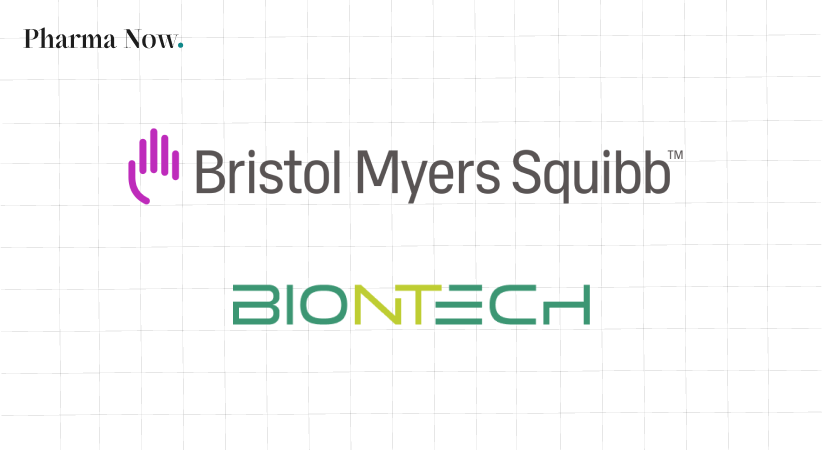BioNTech & Bristol Myers Squibb Unveil First Global Interim Phase 2 Results Of Pumitamig In Extensive-Stage Small Cell Lung Cancer, Showing Promising Antitumor Activity
BioNTech & BMS report interim Phase 2 data showing strong responses for pumitamig plus chemo in small cell lung cancer.
Breaking News
Sep 09, 2025
Simantini Singh Deo

BioNTech SE and Bristol Myers Squibb have shared new interim data from a global Phase 2 clinical trial (NCT06449209) evaluating pumitamig, also known as BNT327 or BMS986545, in combination with chemotherapy for patients with extensive-stage small cell lung cancer (ES-SCLC). Pumitamig is an investigational bispecific antibody that targets PD-L1 and VEGF-A. The findings were presented as a late-breaking oral session at the IASLC 2025 World Conference on Lung Cancer in Barcelona and align with results from a separate Phase 2 trial conducted in China (NCT05844150), which were reported earlier this year at the European Lung Cancer Congress. Both studies showed encouraging anti-tumor responses and a positive trend in progression-free survival, while confirming a manageable safety profile.
The interim analysis included 43 patients with untreated ES-SCLC (Cohort 1) who received pumitamig with standard chemotherapy at two dose levels, 20 mg/kg and 30 mg/kg. As of the August 7, 2025, data cut-off, 38 patients were evaluable for efficacy. The overall response rate was 76.3%, with 85.0% at the lower dose and 66.7% at the higher dose. Disease control was achieved in all patients. On average, tumors shrank by 56.7%, and 89.5% of patients experienced early tumor shrinkage. Median progression-free survival was 6.8 months overall, 6.3 months in the 20 mg/kg group and 7.0 months in the 30 mg/kg group. Median overall survival was not yet mature at the time of this analysis.
John V. Heymach, M.D., Lead Investigator and Chair of Thoracic/Head and Neck Medical Oncology at The University of Texas MD Anderson Cancer Center, stated, “Small cell lung cancer is the most aggressive type of lung cancer with rapid growth, a poor prognosis and 5-year relative survival rate of just 5% in advanced stages.1,2,3 While approximately 60-70% of patients initially respond to current standard of care treatments, most progress within months after treatment signifying an urgent need for new treatment options which improve outcomes. The response rate and early progression free survival we are seeing in this interim analysis are encouraging and merit further investigation in a larger trial to validate pumitamig’s potential to offer patients more durable anti-tumor responses relative to current standard of care.”
“Every innovation we pursue starts with the needs of patients. These interim data for pumitamig presented today show encouraging signals for our science-driven approach to address two fundamental drivers of small cell lung cancer in one single molecule,” said Prof. Özlem Türeci, M.D., Co-Founder and Chief Medical Officer at BioNTech. “Our ultimate goal is to translate science into meaningful survival benefits for many patients by overcoming some of the biggest treatment challenges, not only in small cell lung cancer but also across other difficult-to-treat solid tumors. These interim data for pumitamig represent an important step in the right direction.”
Bryan Campbell, Senior Vice President, Head of Program Leadership, Hematology, Oncology, Cell Therapy at Bristol Myers Squibb, mentioned, “Today’s data add to the growing body of evidence indicating the potential of pumitamig to improve outcomes across a wide range of solid tumors. These are the first-ever data in a global population in advanced small cell lung cancer for a PD-(L)1 x VEGF bispecific antibody, supporting a possible new standard of care for patients with extensive-stage small cell lung cancer. We look forward to continuing to jointly advance research and development of pumitamig as a potential new treatment option with meaningful clinical benefit for patients in need.”
The safety profile of pumitamig in combination with chemotherapy was found to be consistent with what is expected from chemotherapy and therapies targeting PD-(L)1 and VEGF. No new safety signals were reported. The discontinuation rate was 14%. Treatment-related adverse events of Grade 3 or higher occurred in one patient in the 20 mg/kg group and five patients in the 30 mg/kg group.
Looking ahead, a global Phase 3 trial, ROSETTA-LUNG-01 (NCT06712355), is underway to compare pumitamig plus chemotherapy with atezolizumab plus chemotherapy as a first-line treatment for untreated ES-SCLC. This pivotal study is enrolling patients in the United States, the United Kingdom, Türkiye, China, South Korea, and Australia, with additional sites planned. In 2025, pumitamig was also granted Orphan Drug designation by the U.S. Food and Drug Administration for the treatment of small cell lung cancer, reflecting its potential to provide a much-needed option for patients facing this aggressive disease.
